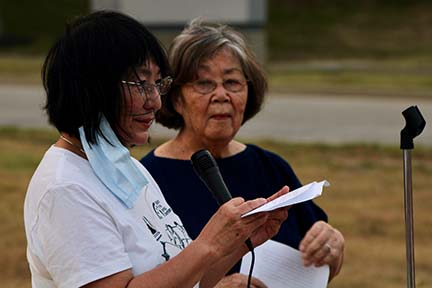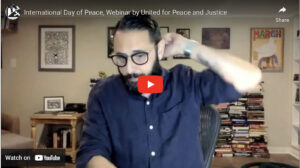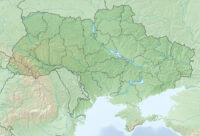—Hiroko Komiya, left, with Keiko Baker, preparing to speak.—Photo by Jim Hannah
By Kristin Scheer
On the evening of Aug. 8, PeaceWorks Kansas City gathered more than 50 people—anti-nuke activists, members of the Greater Kansas City Interfaith Council, along with Vets for Peace-KC, the Green Party-KC, and the International Peace Center of Lawrence, KS. We gathered in memory of the Hiroshima and Nagasaki bombings, and of the lives lost and forever altered 76 years ago.
Henry Stoever of PeaceWorks opened the event, saying, “We live in peril of a global catastrophe. Never again Hiroshima! Never again Nagasaki!” Dave Pack, treasurer of PeaceWorks, said that when the US detonated two nuclear weapons over the Japanese cities, about 226,000 people lost their lives in the first four months following. Most of these people were innocent civilians. He said, “We come in remembrance. We come in moral opposition to the production of nuclear weapons. We come to strengthen our determination to change US nuclear policy, to increase our resolve and our political opposition to these immoral weapons, and to be in community.”
Ron Faust read his poem “Solace” saying we would walk “Sustained by the solace of the grieving gong.”
And with that, our young guest Kosuke Mori-Kreiner rang the gong to begin our solemn witness and the mile-long walk to the National Security Campus entry on Botts Road, where 85 percent of the non-fissile parts for US nuclear weapons are made or procured—here in Kansas City.
Members of the Greater Kansas City Interfaith Council offered prayers for peace. The heart of the program was the sharing from our special guests, Hiroko Komiya, vice president of the International Peace Center in Lawrence, KS, and Keiko Baker, honorary principal of the Japanese School in the KC area—she lived in south Japan an hour a half drive outside Nagasaki when it was bombed. We were so honored to have Ms. Baker with us and to hear her first-hand account. As a little girl, she had been shopping with neighbors Aug. 9, and she remembered the bright lines shooting across the sky. Two days later, she went into Nagasaki with her aunt and uncle, who were looking for her cousin, a student at the university. They were worried for their son. She spoke of the shock and horror of the Japanese people to see their city flattened and darkened with ash. She spoke of the charred bodies “muddy, bloody, and burnt, their hair the color of ash, looking hollow and lost.”
Stoever was moved to apologize on behalf of the people of the US for the bombings. “They were unnecessary and they should never have happened,” he said.
Ann Suellentrop, anti-nuke activist of PeaceWorks, spoke of the hope she sees for our movement. She said, “We can choose the power of love and live, or we can continue to use the power of domination and perish.” Scientists, she said, calculate that a global nuclear disaster would loft soot into the air from burning cities, into the stratosphere, causing a nuclear ice age. “Game over. Nobody wins,” said Suellentrop.
But she is heartened by the worldwide work of ICAN, the International Campaign to Abolish Nuclear Weapons, and the Treaty on the Prohibition of Nuclear Weapons that has been ratified by 50+ countries, making nuclear weapons illegal by international law this past January. All this and more accomplished by grassroots movements. By survivors and soldiers and nuclear workers. By indigenous people whose lands and health have been damaged by uranium mining and nuclear testing. Suellentrop said, “We are still inspired by Gandhi’s words on nonviolence—to change the world by changing ourselves. ‘Love is the strongest force the world possesses. A man is but the product of his thoughts. What he thinks, he becomes. Change yourself. You are in control.’” Ann ended by quoting Jesus himself, who still challenges us: “Love your enemies.”
Then we ended our program with Ann on the saxophone and our own version of John Lennon’s “Imagine.”
—Kristin Scheer, environmental activist, is a PeaceWorks-KC Board member



